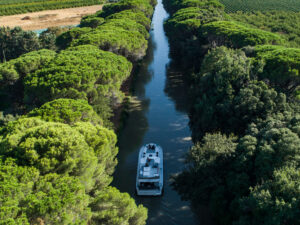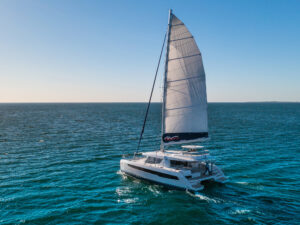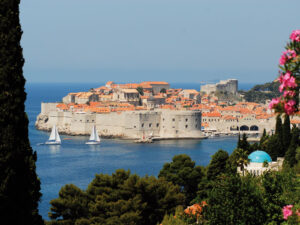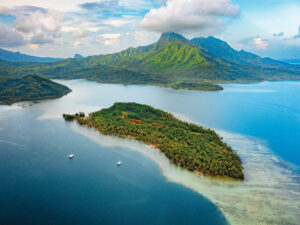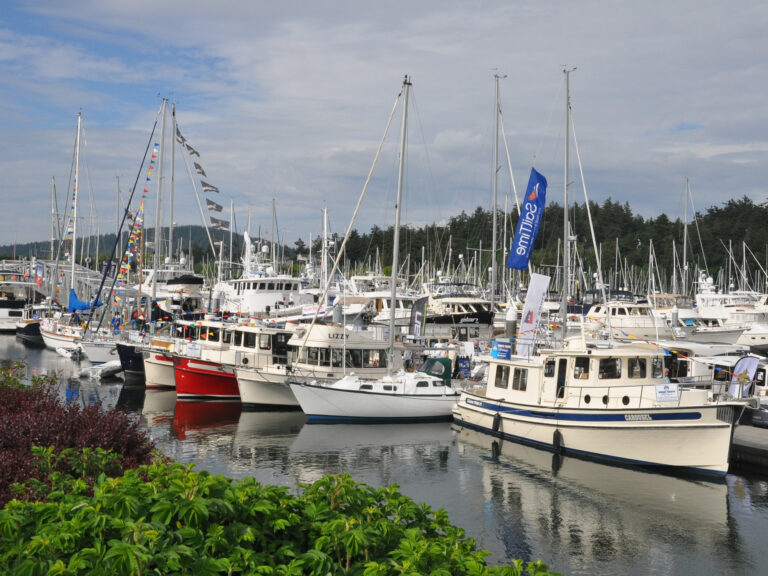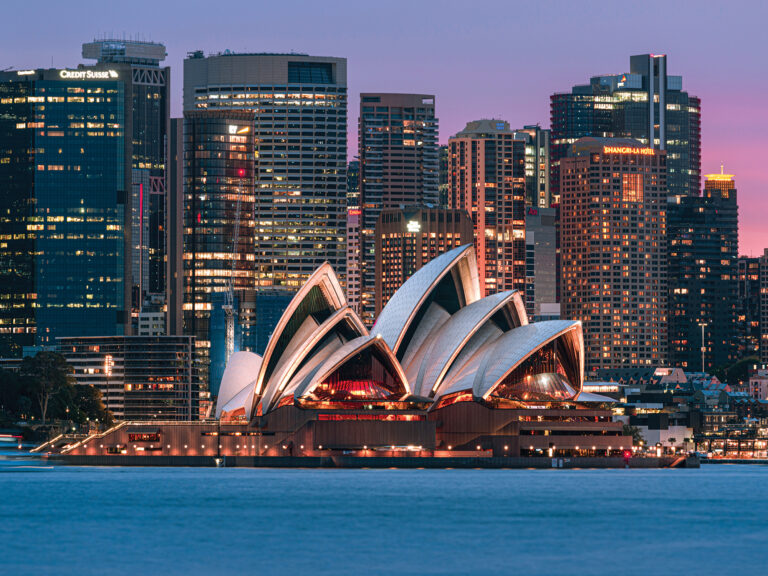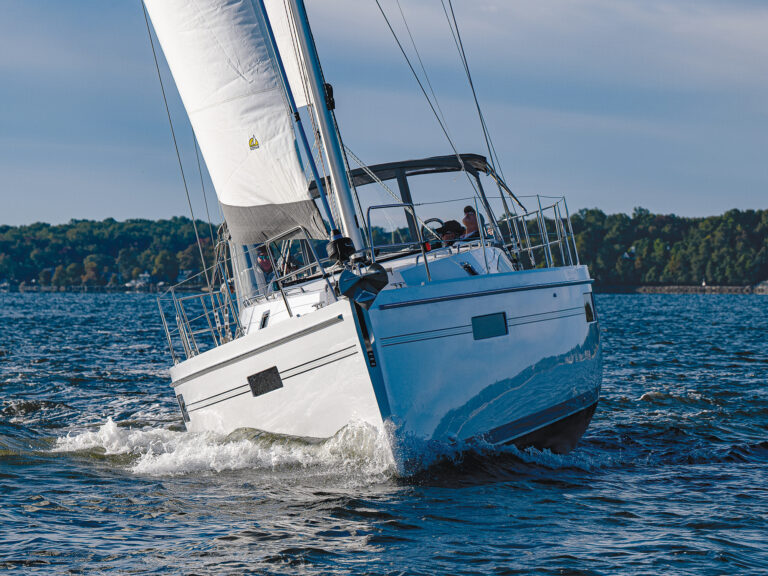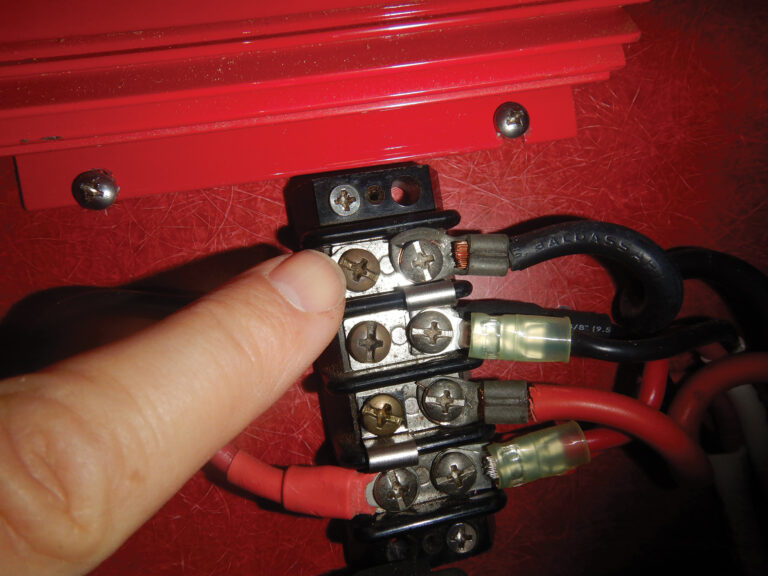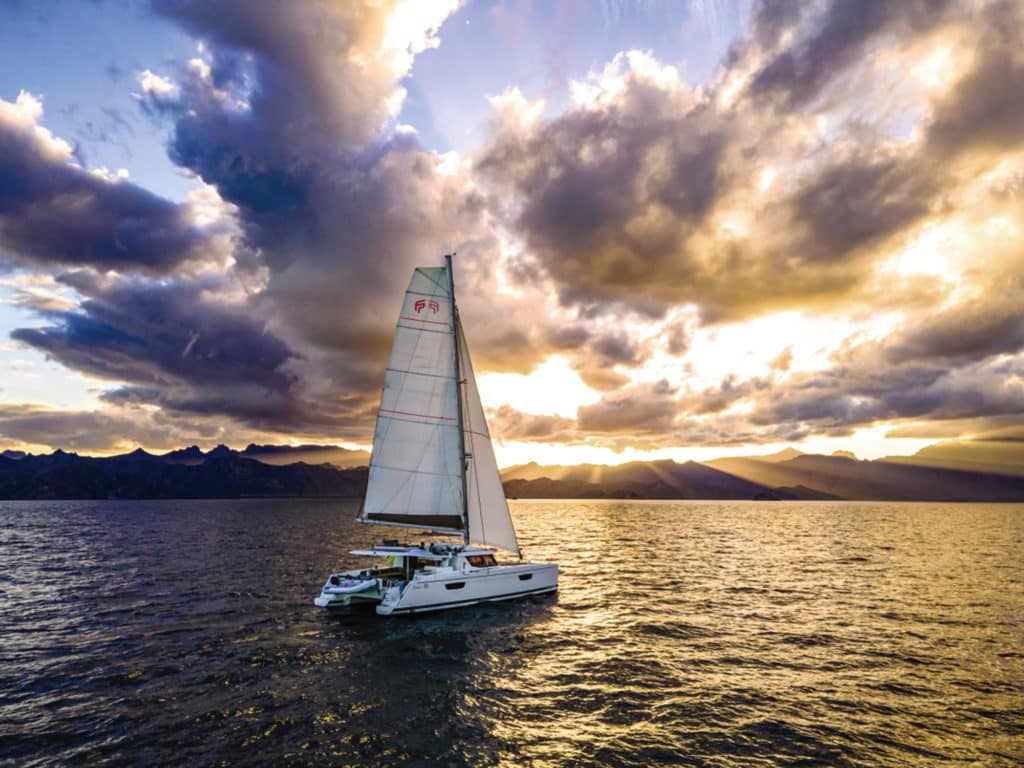
Charlie Cary knew from the first moment he laid eyes on the pristine waters of Sir Francis Drake Channel—the storied strait coursing through the celebrated, sun-splashed isles that constitute the sailor’s paradise known as the British Virgin Islands—that he’d arrived somewhere very special. It was 1969, Cary had recently retired after several decades as a successful corporate executive, and with his wife, Ginny, he’d traveled to the BVI with a rather vague notion of converting his longtime love of sailing into a solid business opportunity.
He was smitten, enthralled, gobsmacked by the sheer beauty of the Sir Francis Drake and the lush islets that dotted its flanks, and also by the astonishing fact that there was little boat traffic, that these were “virgin” islands in more ways than one. The countless protected anchorages were practically empty. There was literally nobody else around.
And then…Charlie and Ginny hung out a shingle for their new enterprise: a bareboat charter outfit called the Moorings, the first of what would become dozens of similar operations, all of which over the next five decades transformed the formerly sleepy British Virgins (and the rest of the Caribbean) into a bustling nautical wonderland, one of the most revered chartering and cruising destinations in the entire world.
Then, in March 2020, in what would usually be one of the busiest months in the crazy high season, the pandemic struck. Basically, and almost instantly, from a traffic and tourist standpoint, the BVI—and the rest of the mostly lock-downed planet, for that matter—reverted to what Cary saw when he initially gazed upon it. Not a sail in sight. A place stopped in its tracks. Indefinitely on hold. The Moorings—and every other charter company in the worldwide network of the vast vacation-sailing industry that had, collectively, more or less adopted its original business model—had come to a complete, utter, screeching halt.
Which leaves us with an open-ended question, with few simple answers.
And then what happened?
The Outset
Symbolically, you could make a case that the BVI represents ground zero in the realm of the chartering universe, the epicenter from which the destructive shock waves of the coronavirus reverberated worldwide. The cold, hard statistics—as gleaned from an annual survey on the state of the chartering, boatbuilding and yacht-brokerage industries conducted by the publishers of this magazine and presented during a Sail America virtual event sponsored by the American Sailing Association—bear it out. Please divert the attention of the young or the frail because these numbers ain’t pretty.
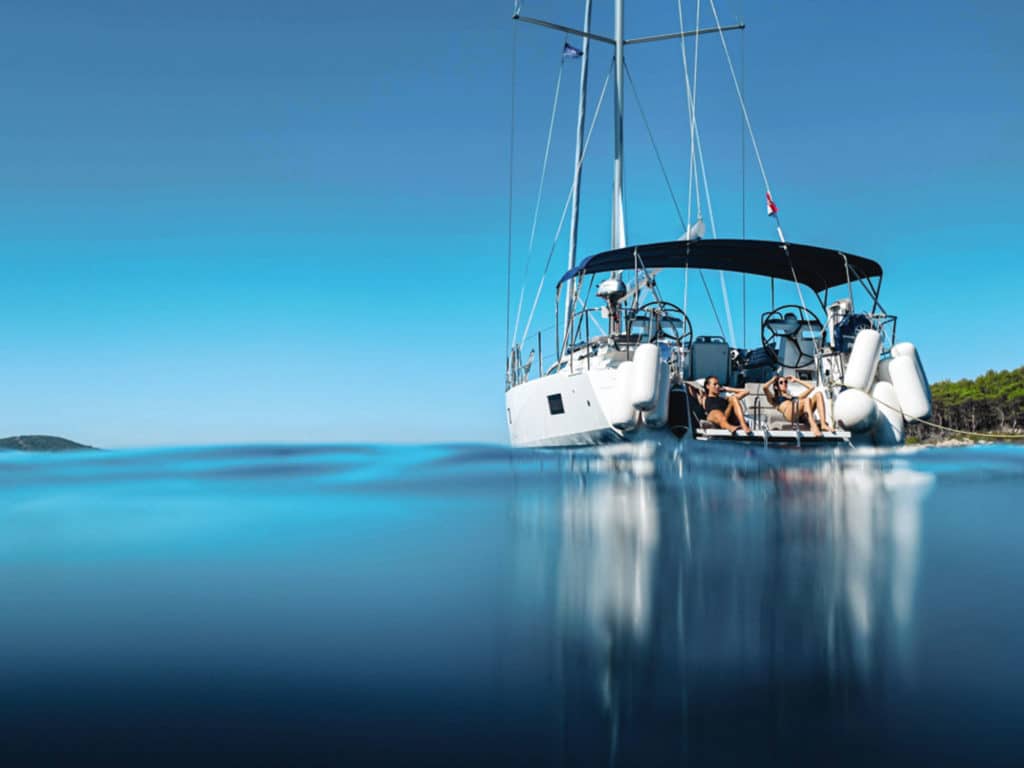
The results cover a span of 12 months, from September 2019 to August 2020: six months pre-COVID-19 and six months during the pandemic. Forty-four active bareboat charter companies were contacted and 92 percent of them participated, including all the market leaders. The news is grim right from the outset: Eighteen companies were shuttered, their voyage of commerce done and dusted forevermore. Digging deeper, several bullet points from the “Key 2020 Charter Market Findings” tell the sad, sorry tale to a fuller extent:
Bareboat chartering is decimated by COVID-19, down 59 percent from 37,022 charter weeks to 15,256 weeks (for sail and power trips) during the period September 2019 through August 2020.
Sail bareboat charter weeks booked out of the North American source market in 2020 are down 57 percent from 31,971 weeks to 13,879 weeks. Powerboat charters fare worse, losing 73 percent from 5,051 weeks down to 1,377 weeks.
Estimated basic bareboat fees in 2020 came in at just over $68 million, almost $100 million less than last year due to a 59 percent drop in business.
Mercy.
Of course, stats are one thing, but to truly comprehend the figures, one needs to speak to the actual people in the trenches who not only crunched the numbers, but also got crunched by them. In a series of interviews conducted with many of the leading charter-industry players, my opening question was a simple one: Do the numbers above, a devastating overall drop in business between 55 and 60 percent across the board, reflect what happened at your company?
“Yes,” said Jesper Rönngard, owner of Navigare Yachting, a 20-year-old enterprise with some 350 yachts in a dozen destinations stationed around the planet. “We might have been worse. We sold only 36 percent of what we were forecast to sell in 2020. When the pandemic hit, everything just stopped. Dead. No sales, nothing, nowhere. All destinations closed. With our staff, we had to cut down, lay off, furlough, whatever. These were my personal friends after all these years. The past 15 months have been an emotional roller coaster.”
“Yes,” said Erin Minner, charter manager for the Americas (and Caribbean) for Dream Yacht Charters, another industry juggernaut with more than three-dozen bases around the world. “We did the Miami Boat Show (in February 2020), and everything was OK, it seemed. A few weeks later, the world stopped. By the end of March, I’d let go half my sales team. We weren’t closing bases but shutting them down temporarily left and right. At the beginning, it was kind of like reliving Hurricane Irma (in 2017, which ravaged the Caribbean) with all the cancellations and rebookings, but on a global scale. It was pretty traumatic.”
“Yes,” said Josie Tucci, vice president of sales and marketing for Travelopia, parent company of charter giants Sunsail and the Moorings. When I spoke to her in early June, she’d just returned to the office for the first time in more than a year, one of only a half-dozen Travelopia staffers (out of the usual 90 or thereabouts) back on the job in the firm’s Florida headquarters.
“We’ve had a stop/start continuation of reopenings at most of our bases that constantly changed last year, and still is changing.”
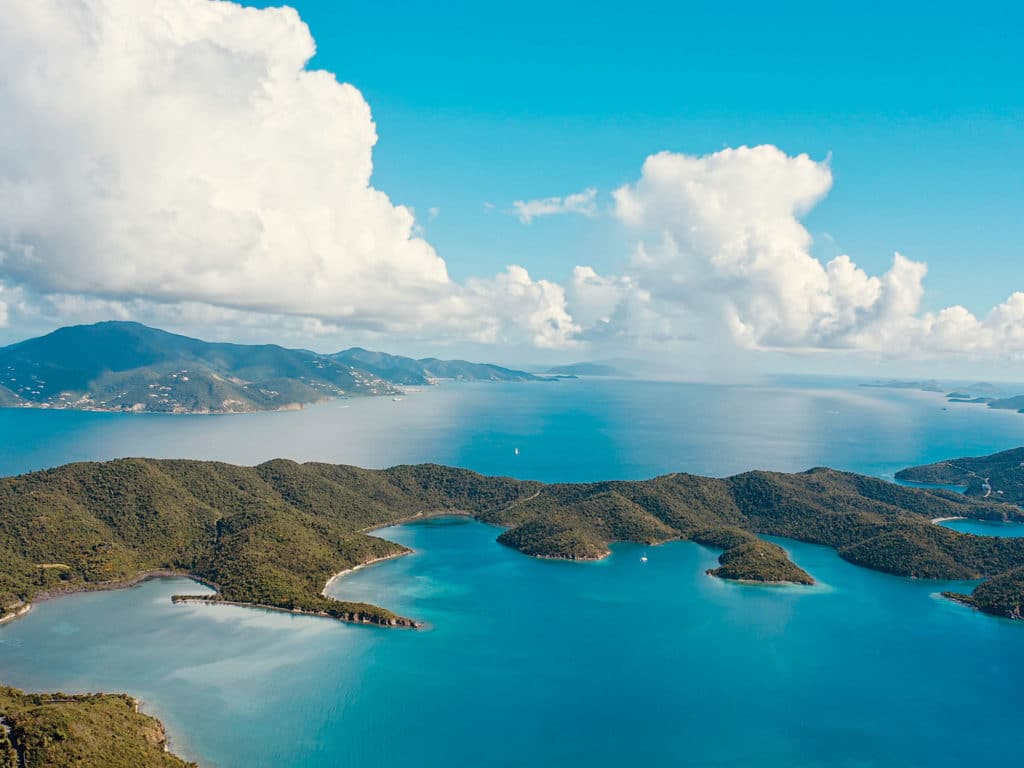
“Reopenings” is the current, magic word of hope and optimism, the welcome light at the end of the pandemic tunnel that has begun in much of the charter world—and everywhere else—to varying degrees. It’s possible, of course, because the virus is waning; US travelers aren’t allowed to travel everywhere (Canada, New Zealand and Australia leap immediately to mind), but at press time in early summer, Americans were allowed to venture forth internationally to nations that were open as long as they presented a negative COVID-19 test administered within 72 hours of returning home.
However, as Tucci notes when discussing Travelopia bases reopening in the Mediterranean, “many Americans could come here but aren’t quite ready for that yet.” There are other reasons some popular European bases are opening back up in fits and starts. “For example,” she said, “with regard to our Med bases, British citizens can’t travel to anywhere that isn’t on their country’s ‘green list’ of acceptable countries without risking quarantine and other things.” The Brits make up an ample portion of Travelopia’s customer base in the Med, which is one reason the Moorings and Sunsail aren’t feeling completely out of the woods. Another, related reason is that Travelopia’s fiscal year runs from October 1 to September 30, so 2021, financially, is looking like another wash.
Elsewhere, along with the antipodal nations of Oz and New Zealand, which have in effect closed ranks (and borders) and swaddled their citizens in a protected blanket free from tourists and visitors, several charter destinations in the southern Caribbean remain closed or with stringent quarantine restrictions, including St. Lucia, Grenada and St. Vincent, the latter of which has suffered through what has essentially been a triple whammy.
Regarding their base in St. Vincent and the Grenadines, Horizon Yacht Charter’s director, Andrew Thompson, made note of the series of eruptions of La Soufrière, St. Vincent’s active volcano, in April of this year. “The Soufrière situation has been incredibly sad,” he said, while questioning whether the Horizon base in St. Vincent and the Grenadines will be able to open and be back on track by this November. “You’re hit by Irma (in 2017), then you’re doused with COVID, then you have a volcano eruption that covers your fleet in ash. It’s just been a nightmare.”
Meanwhile, incredibly, perhaps in a parallel universe, the pandemic was sparking contrasting and prosperous activity in a distinctly specific segment of the chartering world.
The Anomalies
At first glance, Barb Hansen, longtime owner and proprietor of Southwest Florida Yachts in Cape Coral, Florida, and Kurt Jerman, president of West Coast Multihulls in San Diego, seem an unlikely pair. Hansen’s a no-nonsense Florida gal, whose company offers a mix of catamarans for charter but also has a strong fleet of trawlers and monohulls. Jerman’s a Cali dude, who was, is and ever shall be singularly devoted to what he believes are the best, coolest boats on the planet: cruising cats. But both of them share similarities, including business models that offer plenty of instruction and classes in addition to your basic bareboat and crewed chartering, and each also has a yacht-brokerage arm on the side. (Everybody contacted for this article who also sells boats agreed that that side of their businesses went absolutely bonkers over the previous 16 months, which is really the subject of an entirely different story.)
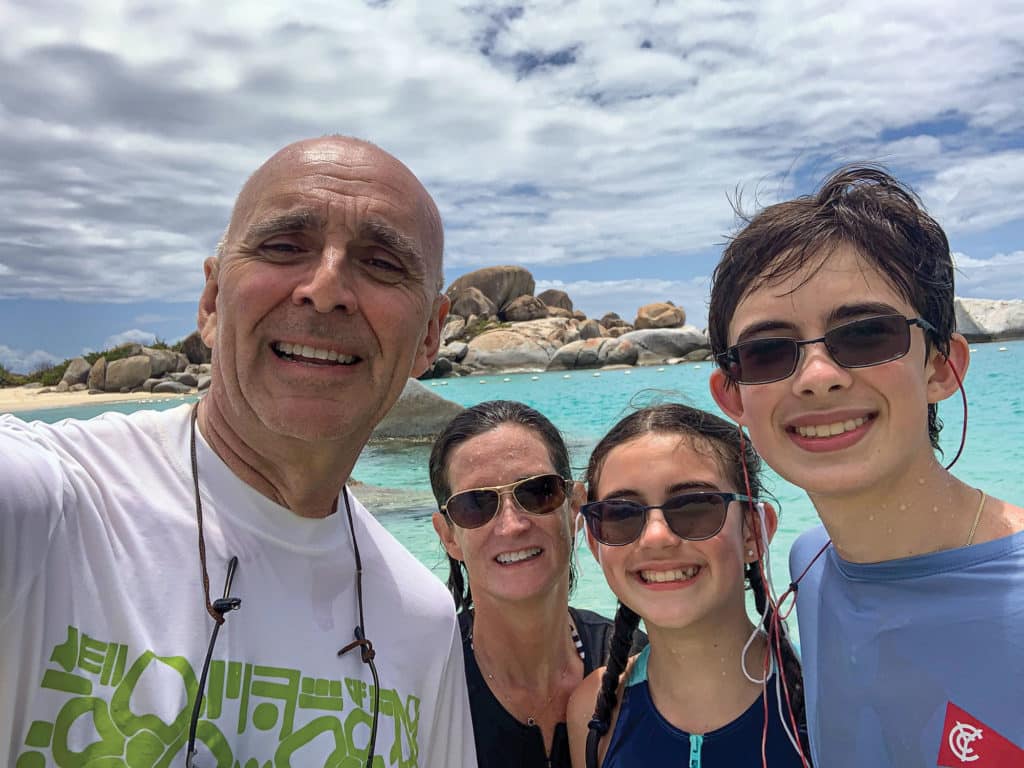
For the purposes of this discussion, however, here’s the thread that links Hansen and Jerman: In 2020, despite the pandemic—or, to be completely honest, because of it—both of them enjoyed one of the wildest, craziest, busiest years in their respective firm’s long history.
California was basically closed for the first two months of COVID. “But,” Jerman said, “once things opened up in June, we ended up having the best year we’ve had in the 11 years since I opened the school and the charter business. It was phenomenal. By the end of the year, we’d exceeded what we’d done the year before. And that was being shut down for two months! It was amazing. About midway through, I was starting to feel guilty. So many people were suffering. But the same thing happened with the biking industry and the RV industry. Businesses that let people do stuff out of doors just thrived through this period. I feel incredibly blessed by the whole thing.”
On the opposite coast, restrictions in Florida weren’t quite as stringent as in California, but April and May 2020 were still quiet. The economy of scale, obviously, is far different for a local charter outfit than a global conglomerate. But business is business, and what the stateside companies were experiencing was something new and unexpected. “About June time, it really, really picked up,” Hansen said, describing a mirror image of what Jerman was experiencing out west. “Everybody was calling and saying: ‘We were going to do this or that, we had vacation plans, but they got canceled. What do you have available?’ So, we ended up with a really busy summer, fall and winter. It was crazy. Good crazy. But crazy. And I think a lot of that is folding over into this year and next, from what I can see.”
What the two companies shared was a domestic destination that people could reach by loading up the family vehicle and driving there. The same phenomenon was underway from sea to shining sea, with charter outfits in the Great Lakes and the Pacific Northwest also reporting bang-up years.
Dream’s Erin Minner, based in Annapolis, Maryland, said: “We had people coming here last year in RVs—driving across the country!—then taking a boat out for 10 days. It’s nuts. In 2019, we had a handful of bookings in Annapolis, maybe 10 a month. Now we’re taking upwards of 30.” In addition to Annapolis, Dream also reopened bases last summer in Newport, Rhode Island, and Lake Champlain, Vermont, and later in the year in Key West, Florida. And how was business in those locations, I asked. “Booming,” Minner said.
But it wasn’t just the US mainland that was off the charts. So too was the US Virgin Islands, which never experienced the major lockdown and restrictions of its neighbor, the BVI, and which was a relatively easy, open place to reach for US citizens. Dream reopened its St. Thomas base in early October and, Minner said, “it exploded. Like nothing we’d ever seen. We went from starting with six boats, and within a few months, we had 90 there.” Dream flooded the territory’s zone by importing yachts from bases such as Martinique and Guadeloupe—French holdings that were greatly affected by that nation’s pandemic policies—and Grenada, which had a 14-day quarantine in effect that essentially closed that shop. “We took the majority of fleets in the Caribbean that weren’t operating at full capacity and moved them to where they could be chartered,” she said.
In the meantime, over in the BVI, matters were slowly, tentatively teetering back toward something called “normal.”
The Pilgrims
Horizon Yacht Charters is headquartered in the central BVI hub of Tortola, and it was there to which its director, Thompson, returned in early March after a brief trip stateside. “My partner and I decided that, as good citizens, we’d isolate,” he said. “That rolled into a government-enforced lockdown at the end of the month, which meant you were not allowed to leave your property, you weren’t allowed past the end of the driveway—for people fortunate enough to have driveways.” The government did allow several days for grocery shopping before shutting down the islands, and another three-day window to reprovision in the middle of the lockdown. But that was it. “It was incredibly stringent,” Thompson said.
It would be eight long months, until December 1, 2020, before people were allowed back to Tortola, but with strict quarantine restrictions in place. Thompson was able to keep Horizon afloat in the interim by putting into place a two-tiered maintenance program for the private yachts he managed in his fleet. Nearly every owner signed up. With that scheme, although he had to cut Horizon’s staff to 20 hours a week, he didn’t have to lay off anyone. “That was our revenue, our cash flow, during lockdown,” he said.
Once he was able to hop on a boat and venture out again, Thompson encountered something unexpected and wonderful, the proverbial silver lining rimming the dark cloud. “It was very quiet, and the whole ecosystem, frankly, had had time to recover,” he said. “All the sea life moved back in, especially the turtles; there was an absolute abundance of hawksbill sea turtles left, right and center. The quality of the water was spectacular, and the joy of picking almost any harbor and being the only boat in it was fantastic. A few clients started trickling back in. The people who came absolutely loved it.”
After the new year, many more customers—particularly those who’d chartered there before, who loved the place and had made the sailor’s pilgrimage to the BVI on multiple occasions—began to book trips and return to the islands. For several months in 2021, a series of multiple COVID tests were required before traveling and once again after arriving; there was also a four-day mandatory quarantine in place, though you were allowed to do so on your charter yacht in designated anchorages. That was cut to a single day on May 1, and on June 15, fully vaccinated travelers no longer had to take a test upon arrival or quarantine at all.
It wasn’t just the domestic market on the US mainland that was off the charts. so too was the USVI, which never experienced the major lockdown and restrictions of its neighbors in the bvi.
A year to the month after the initial lockdown, this past March, the four members of the Sawicz clan from Chicago—having made the trip down to the islands every other year for the past dozen—once again booked a vacation with the Moorings, this time on a 39-foot catamaran (they’d originally planned a sailing trip to Tahiti, which was still shut down, and were more than happy to pivot back to the BVI). What they discovered upon arrival, with regard to limited resources and a traffic-free Sir Francis Drake Channel, was not dissimilar to what Charlie and Ginny Cary encountered at first glance more than 50 years ago. “Empty,” said dad Rich Sawicz, a healthcare professional and lifelong sailor. “Maybe like three boats.”
When it came to their itinerary, the Sawiczes had a simple plan: “My wife said she’d do breakfasts and lunches, but when it came to dinner, she said, ‘I’m off the boat!’ That was the requirement. Our route followed what restaurants we knew were open.”
Like their fellow travelers, the eatery options were few and far between. But old favorites such as Pirate’s Bight, Foxy’s and the Soggy Dollar were all open, and they made it work. And it had some unexpected benefits. When they got to the iconic Baths on Virgin Gorda, which they basically had to themselves, they scrambled up the rocks to the restaurant on the hill and enjoyed an Easter Sunday repast in the company of the locals, all dressed up for the special day. It made it an especially memorable occasion.
A couple of weeks later, when software executive Michael Heffner of Cohasset, Massachusetts—with his wife and two kids, and another couple from their coastal village, with their pair of kids—descended on the BVI, they had a ready solution to the chow question. They chartered their spanking-new Moorings 50 cat, fresh from South Africa on its maiden charter, with a captain and cook. They ate every delicious meal on board.
Compared with the Heffner party’s complicated journey, Homer’s travels in The Odyssey were a saunter through the park. Bookending their charter trip with a couple of days in St. Thomas on the front end and a four-day stay at the resort on BVI’s Scrub Island on the back—then a return swing through St. Thomas on the way home—the eight intrepid travelers entered and exited the various health and safety portals and protocols via 24 COVID tests (all negative) before all was said and done.
Once aboard their yacht, the group actually quarantined aboard in Anegada for the trip’s first four days, along with their fully vaccinated crew, a married couple from Britain. One of Heffner’s favorite pictures from the charter was when skipper Andy dropped the yellow Q flag and they were all free to roam at will.
“It was a worry-free trip,” Heffner said. “We did every kind of watersport—kayaking, snorkeling—and the captain took the kids out on kneeboards in the dinghy, and they loved that. They really leaned into all the activities. The wildlife we saw was incredible—the turtles, the big tarpon, the dolphins. It was an amazing trip. We’d certainly do it again.”
Rich Sawicz is also up for a return holiday. “Definitely,” he said. “Of course, there’s two sides to the coin: Nobody is going to experience what we did, with so many areas totally to ourselves. But we’ll be back in a heartbeat. I recommend a BVI charter to people all the time. This is the best vacation you could ever imagine.”
The Awakening
All of which brings us to the here and now, the greatly anticipated summer of 2021 and that which will follow. Each and every one of us—and each and every business—has lived their own version of the COVID experience. As travel restrictions are eased in the US, and daily routines again become, well, routine, there’s a sense of an awakening in everyday life, one that the charter industry hopes to capitalize on.
In that sector, the overall positive vibe, the aura of optimism, is palpable.
The domestic operators want to continue to ride the wave they’ve already hooked onto. “I’ve been doing this for 25 years, playing with these silly catamarans,” Jerman of West Coast Multihulls said. “Finally I’ve lived long enough to see them really dominate the sailing world, and especially the chartering world, where they’ve become fairly dominant and taken over. We’re so excited. We see a lot of growth potential.”
Down at Southwest Florida Yachts, Hansen said: “The interest in sailing is getting stronger. We’re thinking about adding more sailboats. It’s not just younger people either, but middle-aged folks wanting to learn to sail. Business definitely picked up in the last year, and I think [the next year] will be better. I think people are ready to go. Do something.”
The larger companies, of course, aren’t looking to capitalize on bigger pandemic numbers, but rather to almost start fresh in the reopening. To get back to where they were and relaunch from there. And they sure seem prepared to do so.
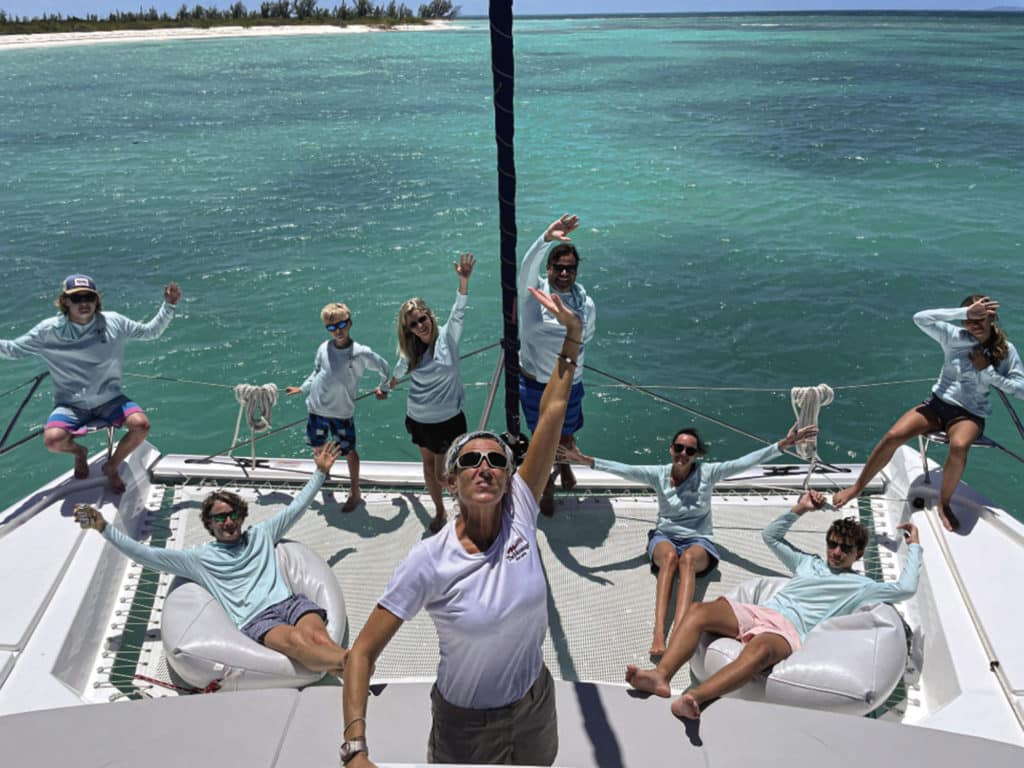
“What’s great now is that we’re finally feeling like we’re through this,” Navigare’s Rönngard said. “Our second half of 2021, the next six months, is booked at a higher occupancy rate than I’ve ever had before. It’s fantastic. More than ever, people have money. They didn’t spend a lot during the pandemic. My numbers for what’s coming are through the roof. We all feel like [we’re waking up]. I feel it too. You want to throw parties, see your friends. That’s what you’re dying to do. I think people are just fed up, and they are certainly booking an enormous amount of trips.”
“Here in the BVI, fully vaccinated people are basically free to go after a negative test on Day One of their trip,” Horizon’s Thompson said. “That’s a game-changer. As a result, our June and July bookings aren’t a million miles off from a normal year. And December and beyond, when we reopen after hurricane season, is also booking up well. We’re very hopeful.”
“Business started picking up in the latter part of 2020,” Dream’s Minner said. “Now, for the past five months, we’ve been hitting records I’ve never seen. The jump in numbers came fast, and without warning. So we’re seriously trying to hire back sales staff and meet the demand for the inquiries coming in. It’s been quite the roller coaster, quite an adjustment. It’s been a lot, but it’s been good. Everyone’s very happy about getting back to business, selling charters again. That’s what we all do and what we’re here to do.”
“As people get vaccinated, the confidence level is really rising,” said Tucci, of the Moorings. “It’s like a switch got flipped and everybody decided to book their holidays. Stuff is flying off the shelves for next year, and it’s going to surprise some people because they’re possibly thinking that everyone is still waiting to see what happens. But it might be a little tough for anyone who hasn’t booked their vacation yet.”
The positive vibes are encouraging, no question. And the forecasts do seem terrific. But at the end of the day, if the pandemic has taught us anything, it’s that nobody knows what the hell will actually happen moving onward. History is yet to be written. But the cold, hard fact is that history was made in the charter industry in 2020, and despite the strong domestic market, it was largely for all the wrong reasons. And history will again be made, as it always is. This time, fingers crossed, maybe for all the right reasons.
Herb McCormick is CW’s executive editor.

